
Step into the Thoughts of a (former) Bar Candidate (Now Lawyer!)
What started as online storage for the notes of this former bar candidate will now be a continuing passion project. I will work on this ad infinitum. This will be a good alternative for law students who do not have the luxury of buying expensive textbooks. I started with Political Law, but I had to jump to various other subjects. Why? Because let’s face it, no one can study everything in the bar syllabus in such a short amount of time. How much more difficult would it be if we were to write about it?
So step right in. The Bar is open.
I will include links to all the cited cases so that it would be easier to get enlightenment directly from the source (Warning: The links to some cases don’t work properly. The SC website apparently changes its links after some time).
Check the Syllabus Navigator at the bottom of this page to see which topics have already been covered.
The contents of this site are copyrighted and for personal use only. Please do not distribute for profit.
The Bartender’s Cocktails:
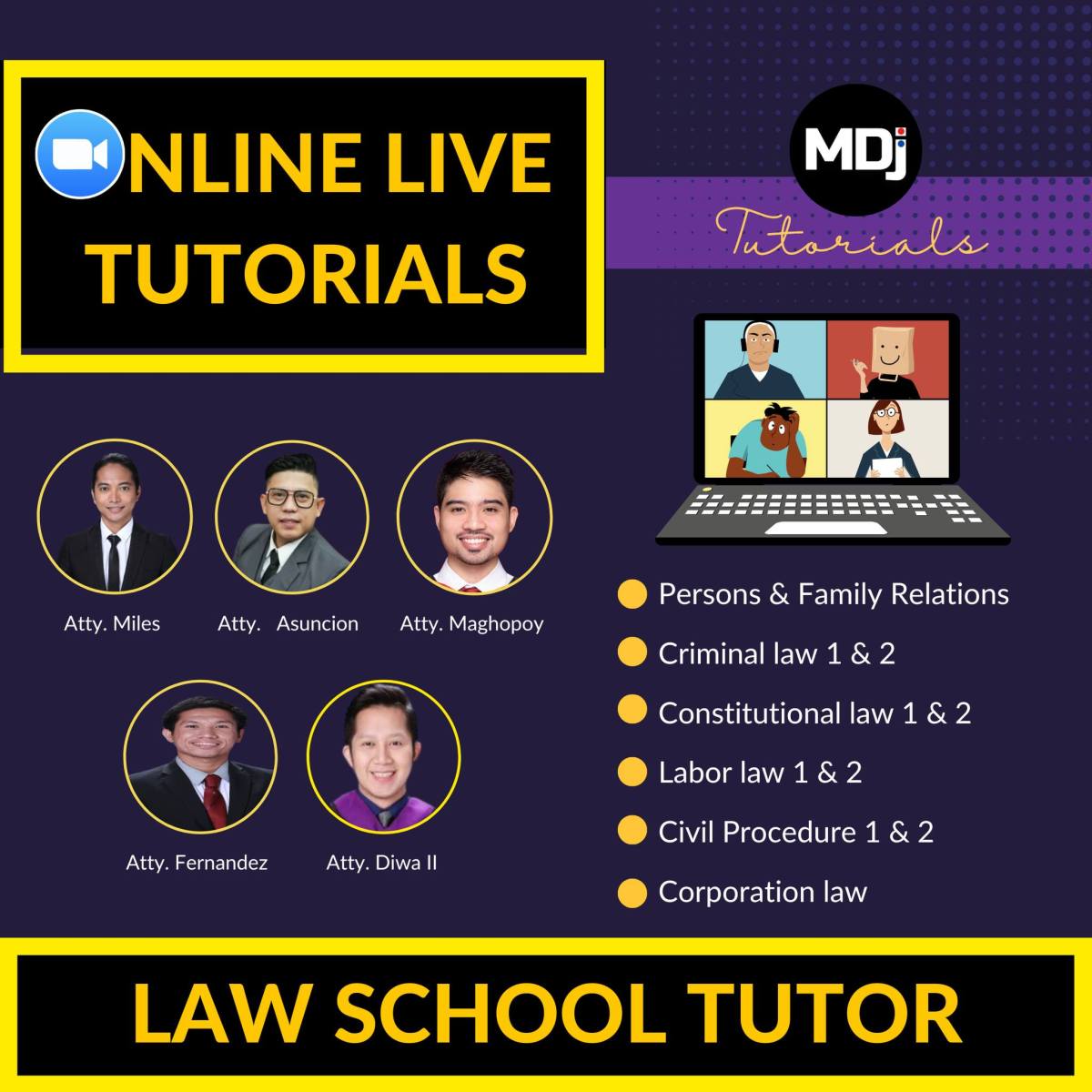
Tutorial for Labor 1 and 2
It turns out that opening an office and going into practice with my fiancee are not activities that can be paired with maintaining this blog. And now with an added tutorial gig, I don’t think I can promise new blog posts anytime soon. What I can promise though is that we’ll be having comprehensive discussions…
Keep reading
Labor Law Bar Exam Questions Topics (2009-2019)
As promised, here is my compilation of the topics asked under Labor Law during the 2009-2019 Bar Exams. Do what you must with this data, but I advise you to focus on studying the most often-asked questions first. If you find yourself out of time, this list is useful in giving you confidence that you…
Keep reading
Writs of habeas corpus, kalikasan, habeas data, and amparo
This particular entry was just added to the 2022 Political Law bar syllabus, particularly under the Bill of Rights (even if I think it’s better suited for Remedial Law). Does that mean that it’s going to come up? Probably, but I think the question won’t focus too much on the procedure. So let’s talk about…
Keep reading
Political Law: What To Expect
We’re back! It’s been a long time since we posted anything here. That’s what happens when you have a job from 7 a.m. to 9 p.m., I guess. But that doesn’t matter now because we have all the time in the world to continue our bar review series. We started this blog series with the…
Keep readingHonesty and belief: An unexpected story of how I became a news editor
Two years of review, isolation, and exhaustion culminated in 16 hours of tests crammed in 3 days. I can finally say that the Bar Exam is over. But, after about a week of rest, I realized that I lost two years of my normal life and perhaps my skills. How can I now earn money?…
Keep reading
What Now?#PostBestBarEver
It’s been more than a week since the bar exams ended. Most bar candidates (including me) probably would want to move on and venture into activities that would keep their minds busy. Who wouldn’t want to forget that experience when all we’ve been reviewing for 1-2 years were compressed into 16 grueling hours in three…
Keep reading
Labor Law Bar Exam Reviewer
Done with labor reviewer. Here’s the link. NOTE: The document was last edited 12:26 PM, January 7. Good Luck!!! Will try to make Poli next time.
Keep readingJust and Authorized Causes
This first question is an objective one. It will not be asked in the 2022 bar exams because the Omnibus Guidelines provide that questions will be about a “specific legal problem.” Anyway, based on the answer above, we’re already familiar with just and authorized causes. But we’ll talk about the entire main topic where just…
Keep reading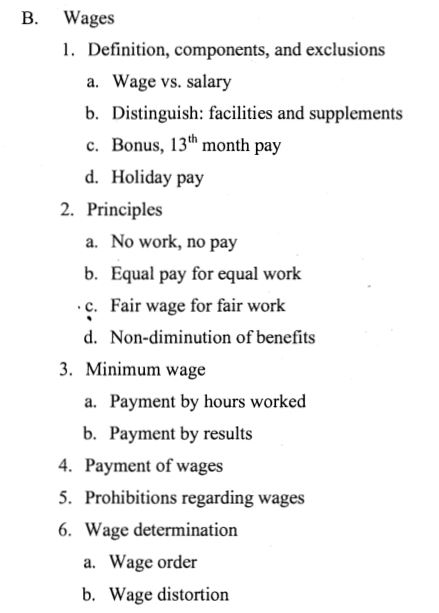
Labor Standards Part II (Wages)
Last time, we went over Hours of Work, Rest Periods, and Service Charge. It’s now time to finish Labor Standards starting with Wages. Wages 1. Definition, components, and exclusions Let’s start with the definition of wage. Wage encompasses every remuneration or earnings, capable of being expressed in terms of money, payable by an employer to…
Keep reading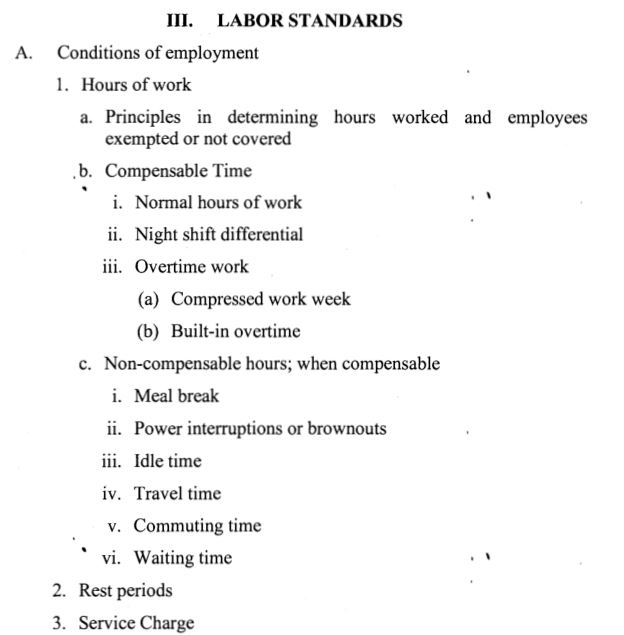
Labor Standards Part I (Conditions of Employment: Hours of Work, Rest Periods, Service Charge)
Now that we got Recruit and Placement and Christmas out of the way, it’s time to reset and go to Labor Standards. I think it’s better to first tackle Employer-Employee relationship when we get to the gist of labor law, but that’s not how the syllabus is sequenced. Let’s see if following the syllabus works.…
Keep reading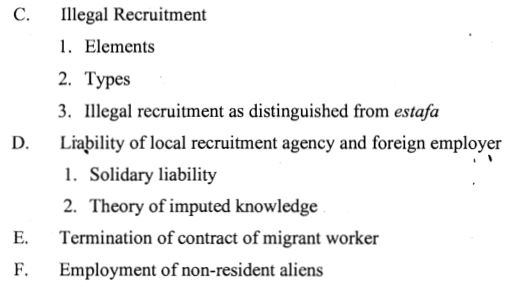
Recruitment and Placement Part II (Illegal Recruitment, etc.)
We finished off prohibited practices last time. But we’ll have to revisit it as it’s connected with illegal recruitment. To recap, prohibited practices are under Art. 34 of the Labor Code. The Mnemonic device suggested by Usec JBJ is SOBIGGAWIFE. SOBIGGAWIFE (Art. 34)•Substituting or altering contracts approved and verified by DOLE/POEA•Obstructing the Labor Secretary’s inspection•Becoming…
Keep reading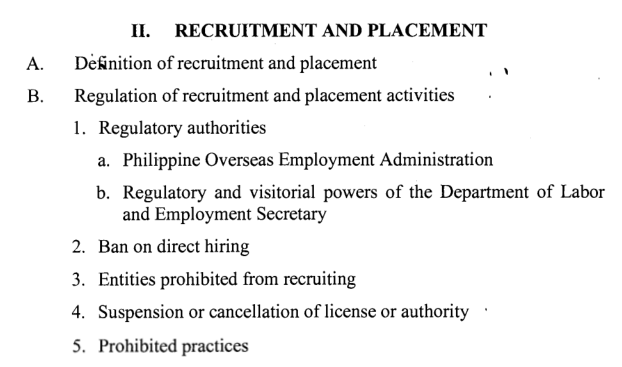
Recruitment and Placement Part I (Definition of recruitment and placement + Regulation of recruitment and placement activities)
Undersecretary JBJ says these are the important Labor Code provisions in relation to Recruitment and Placement:13- Definitions34- Prohibited Practices38- Illegal Recruitment40- Employment Permit of Non-resident Aliens While the second most important are:18- Ban on Direct-Hiring27- Citizenship Requirement37- Visitorial Power41- Prohibition Against Transfer of Employment42- Submission of List But we’ll get to these later. Let’s go…
Keep reading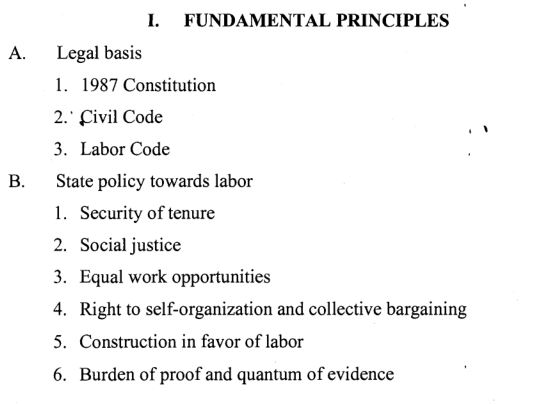
Fundamental Principles in Labor Law
Let’s start with the lighter side of the syllabus, the fundamental principles. (Edit September 2022: If you want to learn more, I have a tutorial program ongoing. It will be of great help in expanding my passion project. You can sign up at https://sophia.milesfajardo.com/1st-register/?fbclid=IwAR1hmuoneQgVNTOcA0B3ZgO1gYjZeDsQoH6J-kvfKPyKmiNODMyxMIBC-9A) But before we do that, let’s first know what labor is.…
Keep readingRape
Just some notes on rape:https://drive.google.com/file/d/1zN8pF8WtAHk4dxytK7Q-WkYKpXnLD86X/view?usp=sharing Preview:
Keep readingSuccession: Article 805 (Formalities of a Notarial Will)
Article 805. Every will, other than a holographic will, must be subscribed at the end thereof by the testator himself or by the testator’s name written by some other person in his presence, and by his express direction, and attested and subscribed by three or more credible witnesses in the presence of the testator and…
Keep readingPreliminary Investigation Process
A visual guide to the annoying Preliminary Investigation. Imgur LinkPDF Link
Keep readingExecution (Rule 39)
Raw notes on Execution from Atty. Salvador III’s lectures+ some provisions/illustrations/Riano comments The font is a little too small. Needs to be downloaded for unlimited zoom in. https://drive.google.com/file/d/1GlJ-ZDZzEhrNegx8ddEMetC5zJVZtSJi/view?usp=sharing Notable provisions: “Walang pupunta sa bar if hindi alam ang…” Sec. 6, 9, 10, 11
Keep readingRemedies after Judgment
Notes based on Atty. Tranquil Salvador III’s lecture. Download to Zoom in:https://drive.google.com/file/d/1No_8Xm0_dFR1TxDmxcQiiW03qW-cY6IB/view?usp=sharing Preview:
Keep readingPhilippine Competition Act
This is actually a very well done primer made by the PCC: Link to Primer They also made Bar Review Materials! Link here Other PCC educational materials:https://www.phcc.gov.ph/infographics/philippine-competition-act-r-a-10667/https://www.phcc.gov.ph/infographics/things-you-need-to-know-about-the-philippine-competition-act-by-august-8/https://www.phcc.gov.ph/infographics/what-is-the-philippine-competition-act-pca/ Here’s my version including the text of the RA 10667, its IRR, Memo Circulars, Resolutions, etc.:Imgur LinkPDF Link
Keep readingIntellectual Property Overview Diagram
Atty. Negre’s “Good-to-go” IP Diagram for the Bar. Link: https://i.imgur.com/Lh8EsLR.pngPDF link
Keep readingTransportation Law (Common Carriers, Vigilance Over Goods, Safety of Passengers)
COMMON CARRIERS Just a little bit of background first. The Civil Code has meticulous provisions on common carriers because the service they offer is essential to the public. The country will suffer if the rules surrounding common carriers (liability, responsibility, degree of diligence, etc.) are unclear. In other words, common carriers are imbued with public…
Keep readingCivil Procedure Part VI (Rule 18)
We’ve covered Motions and Dismissal of Actions in our last post. Let’s now go to the rather long but important rule on Pre-trial. “The importance of pre-trial in civil actions cannot be overemphasized. In Balatico v. Rodriguez, the Court, citing Tiu v. Middleton, delved on the significance of pre-trial, thus:Pre-trial is an answer to the…
Keep readingCivil Procedure Part V (Rules 15 and 17)
We’re done with Summons, let’s move on to Rule 15, Motions. RULE 15- MOTIONS Why don’t we start with the last provision of Rule 15 to shake things up? Just kidding, it’s good to start with Sec. 13 because this is tied directly with what we already learned before: affirmative defenses and grounds for dismissal.…
Keep readingCivil Procedure Part IV (Rules 11-14 and 22)
Let’s continue our discussion with Rule 11 and see where we go from there. RULE 11- WHEN TO FILE RESPONSIVE PLEADINGS This Rule speaks mostly just about time, so we’re probably better off making a diagram for provisions about time. Here’s the imgur link that can be zoomed in/downloaded. As for the more substantial provisions:…
Keep readingCivil Procedure Part III (Rules 7, 9, 10)
Last time, we focused on Rule 6, 8, and Rule 34 (which only has two sections). Now, let’s start with Rule 7 and see where that takes us. RULE 7- PARTS AND CONTENTS OF PLEADING We have the sort of inconsequential Sections 1 and 2. SECTION 1. Caption.— The caption sets forth the name of the court,…
Keep readingCivil Procedure Part II (Rules 5, 6, 8, and 34)
We’re done with Rules 1-4 in our previous post, let’s continue with Rule 5. But wait, before that, let’s have a bird’s eye view of the flow of ordinary civil actions for initiatory pleadings:1. It starts with Rule 2: Cause of Action- Do you have a cause of action? 2. If you have a cause…
Keep readingCivil Procedure Part I (Rules 1-4)
Previously, we discussed jurisdiction. Let’s move on to the provisions of the Rules of Court GENERAL PROVISIONS- RULE 1 SECTION 1. Title of the Rules.— These. Rules shall be known and cited as the Rules of Court. SEC. 2. In what courts applicable. — These Rules shall apply in all the courts, except as otherwise provided by the…
Keep readingJurisdiction
Our flow will be guided by Dean Tranquil Salvador III’s lectures. General v. Special Jurisdiction General Jurisdiction: The power to adjudicate all controversies, except those expressly withheld from the plenary powers of the court Special Jurisdiction: Which restricts the court’s jurisdiction only to particular cases and subject to such limitations as may be provided by…
Keep readingSpecial Proceedings (ongoing)
We’ll just put the whole discussion on special proceedings topic in one post. We have these main topics:1. ESTATE PROCEEDINGS (Many sub-topics)2. TRUSTEES3. ESCHEAT4. GUARDIANSHIP5. ADOPTION6. WRIT OF HABEAS CORPUS7. WRIT OF AMPARO8. WRIT OF HABEAS DATA9. CHANGE OF NAME and Rule 103, Rule 108, R.A. 904810. CANCELLATION/CORRECTION OF ENTRIES IN THE CIVIL REGISTRY- Rule…
Keep readingAttempt to Finish Evidence
We’ve already discussed the General Principles (which also include the provisions that provide for exclusions of evidence), the Hearsay Rule, Judicial Notice and Judicial Admission, Object Evidence, Original Document Rule. However, since there’s no time left for evidence, in an attempt to finish studying, I’ll just put here the remaining important provisions. But, Authentication will…
Keep reading
Original Document Rule
This is a new rule that replaced the Best Evidence Rule. “The ‘Best Evidence Rule’ (BER) is a misnomer because it misleadingly suggeststhat the doctrine applies to all types of evidence. BER only applies to documents orwritings. As such, there is no requirement that parties introduce the best availableevidence bearing on other matters that they…
Keep reading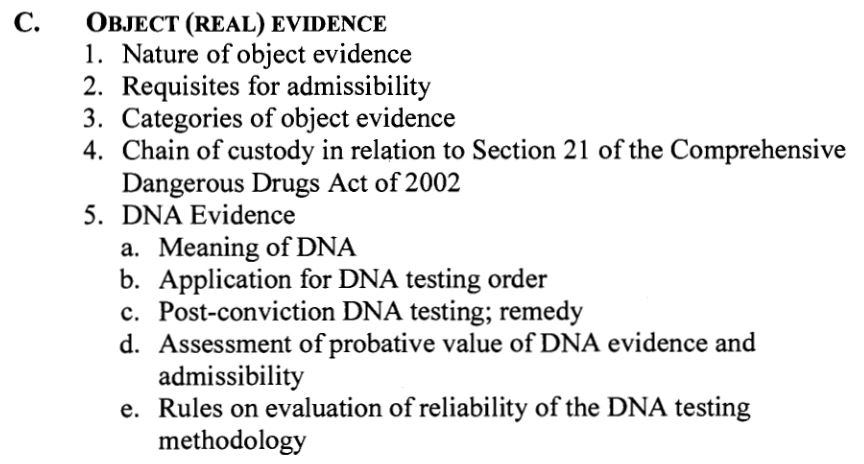
Object (Real) Evidence (rushing)
NATURE Object evidence is evidence addressed to the sense of the court. Anything can be an object evidence as long as it can be seen, smelled, heard, felt, or tasted and that it’s also offered to be seen, smelled, heard, felt, or tasted. RULE 130, Section 1. Object as evidence. – Objects as evidence are…
Keep reading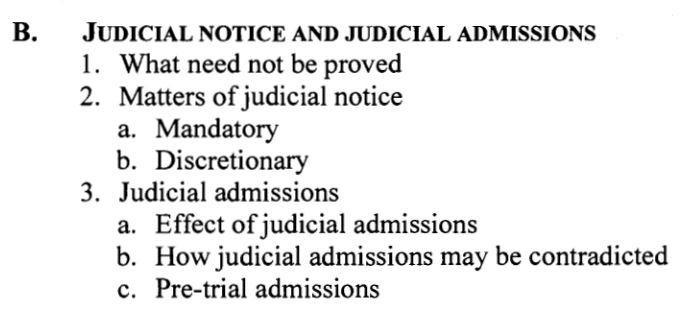
Judicial Notice and Judicial Admissions
This is basically just a summary of Rule 129: WHAT NEED NOT BE PROVED. Section 1. Judicial notice, when mandatory. – A court shall take judicial notice, without the introduction of evidence, of the existence and territorial extent of states, their political history, forms of government and symbols of nationality, the law of nations, the…
Keep reading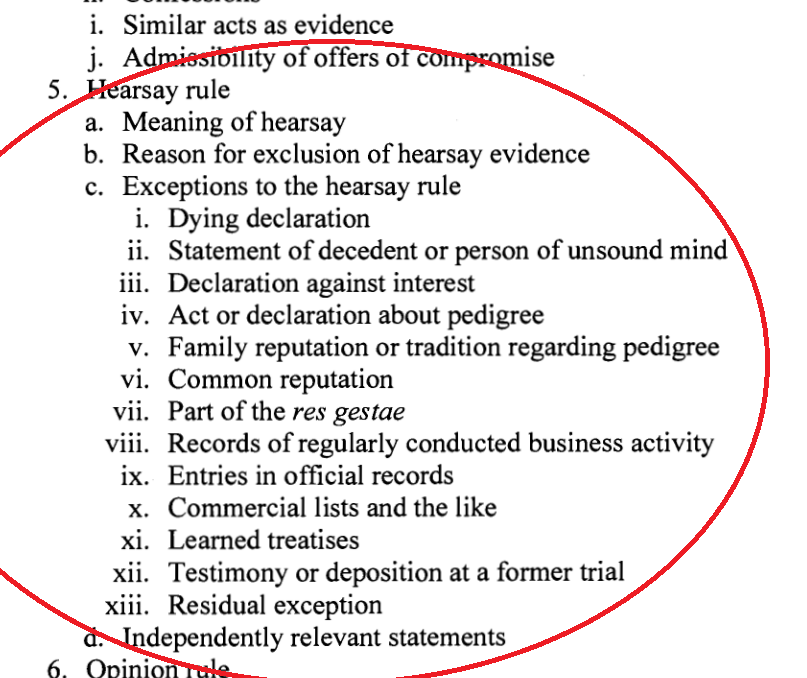
Hearsay Rule
This topic is a bar favorite so it deserves its own post. Meaning of Hearsay (Disclaimer: I edited the explanation here on the meaning of hearsay. I think my previous explanation was a bit off.) The meaning of hearsay was finally codified and can be found in Sec. 37, Rule 130, Revised Rules on Evidence:Section…
Keep reading
Evidence Part I: General Principles
Evidence takes up one whole book so there’s a lot of principles to digest. There are also new amendments that are yet to be tackled in jurisprudence so we’ll have to depend on the provisions with respect to the amendments. To look at the significant changes brought upon by the new rules on evidence, see…
Keep reading
Right Against Involuntary Servitude, Ex Post Facto Laws and Bills of Attainder
We’re down to our last post on the Bill of Rights! Yay. Review proper is coming up and these posts will most likely not follow any specific order anymore. It’s nice that we’ll be done with the Bill of Rights before that. Anyway, let’s get to it. RIGHT AGAINST INVOLUNTARY SERVITUDE This is a pretty…
Keep reading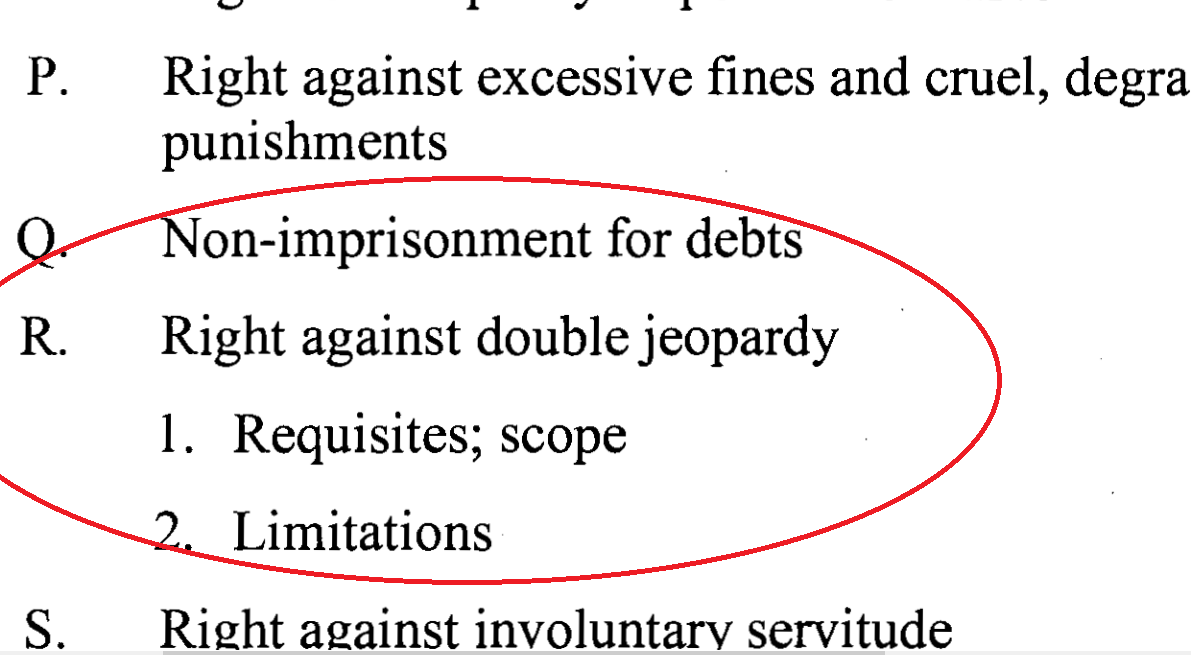
Non-Imprisonment for Debts and Right Against Double Jeopardy
We’re nearing the end of the Bill of Rights (Article III), the article with the most questions in the Political Law Bar Exams. Yay. Double Jeopardy will also be the last “mind-numbing” topic, so let’s get this done. NON-IMPRISONMENT FOR DEBTS The prohibition on imprisonment for debts is embedded in Sec. 20: It’s pretty straightforward…
Keep reading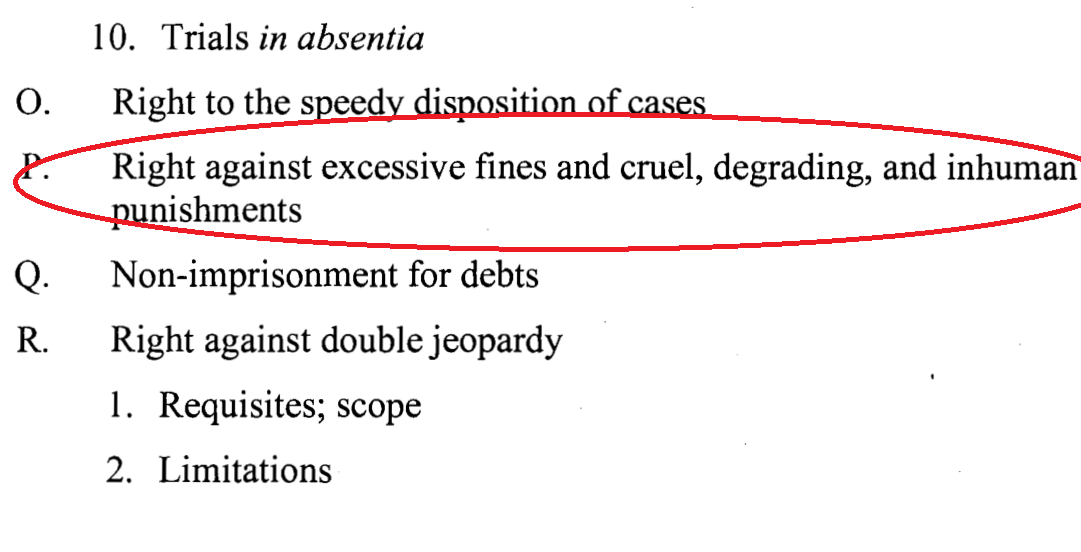
Right Against Excessive Fines and Cruel, Degrading, and Inhuman Punishments
These rights are embedded in Sec. 19 of the Constitution. RIGHT AGAINST CRUEL, DEGRADING, INHUMAN PUNISHMENT Justice Leonen masterfully and wholly explains the right against cruel, degrading, and inhuman punishment in his Separate Opinion in In the Matter of the Urgent Petition for the Release of Prisoners on Humanitarian Grounds in the Midst of the…
Keep reading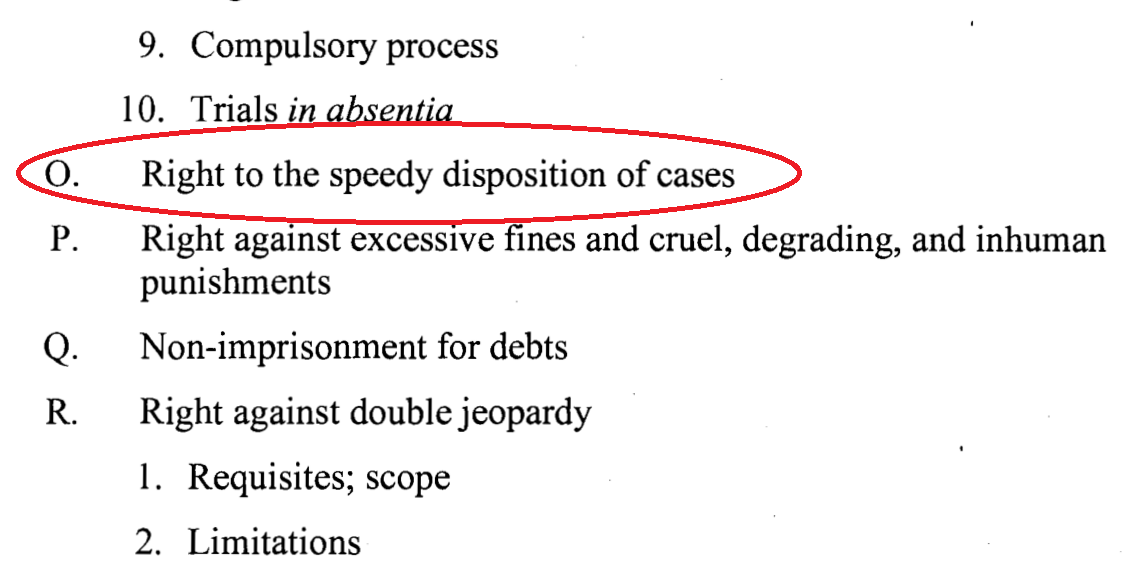
Right to the Speedy Disposition of Cases
We’ve discussed the principle behind this right when we talked about the right to speedy trial. So what’s the difference between the right to speedy trial and the right to the speedy disposition of cases? It’s just the application:”The right to a speedy trial is invoked against the courts in a criminal prosecution. The right…
Keep reading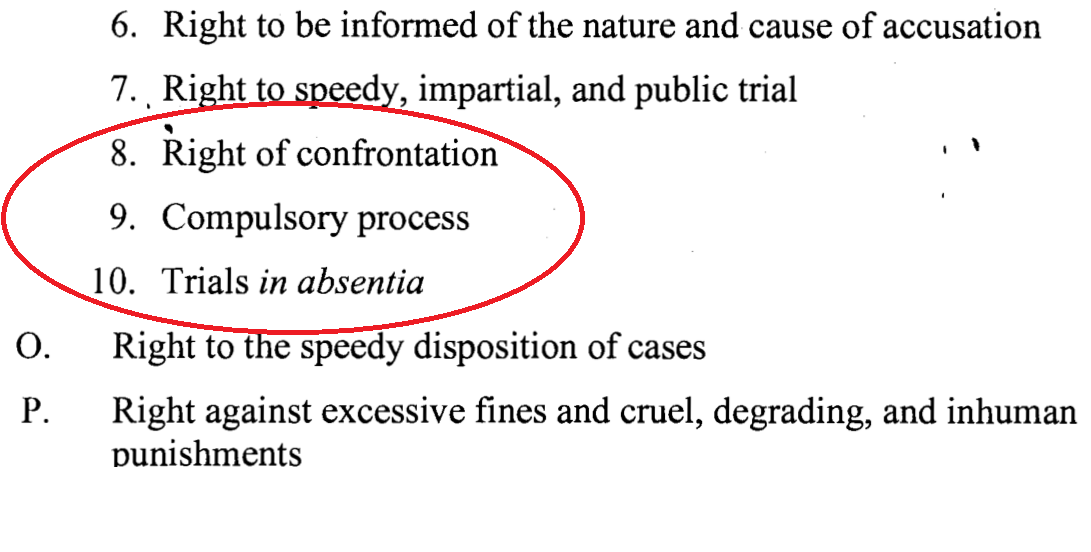
Rights of the Accused: Part IV (Right of confrontation, Compulsory process, Trial in absentia)
Onto the last part of rights of the accused. RIGHT OF CONFRONTATION This right is often associated with the right to cross-examine a witness. “The right of confrontation is one of the fundamental rights guaranteed by the Constitution to the person facing criminal prosecution who should know, in fairness, who his accusers are and must…
Keep reading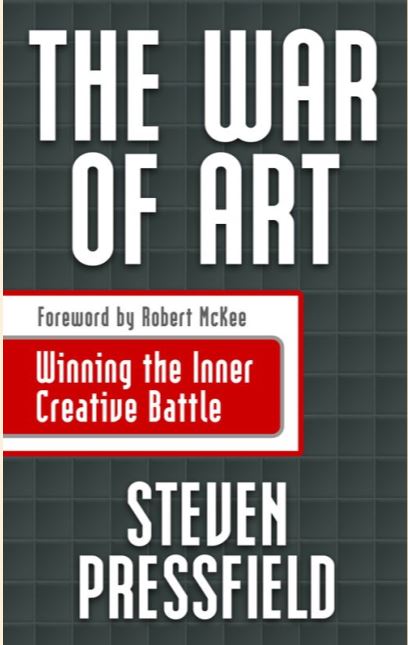
The War of Art by Steven Pressfield
Hey guys. In your free time, if you want a light non-law related reading, try the War of Art by Steven Pressfield. Just read the first two parts as the third and last part is more suited for artists. I’ll also summarize it here. The book is centered on a powerful, invisible, toxic force called…
Keep reading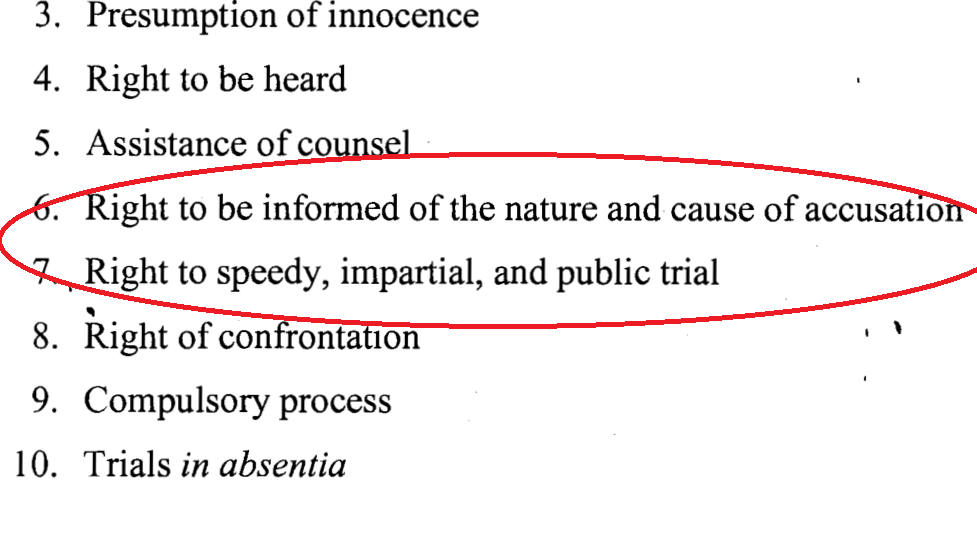
Rights of the Accused: Part III (Right to be informed of the nature and cause of accusation, Right to speedy, impartial, and public trial)
Let’s continue our discussion on the rights of the accused. right to be informed of the nature and cause of accusation This right refers mainly to the part of the arraignment proceedings where the accused is informed of the nature and cause of the accusation against him based on the Information or complaint, and whether…
Keep reading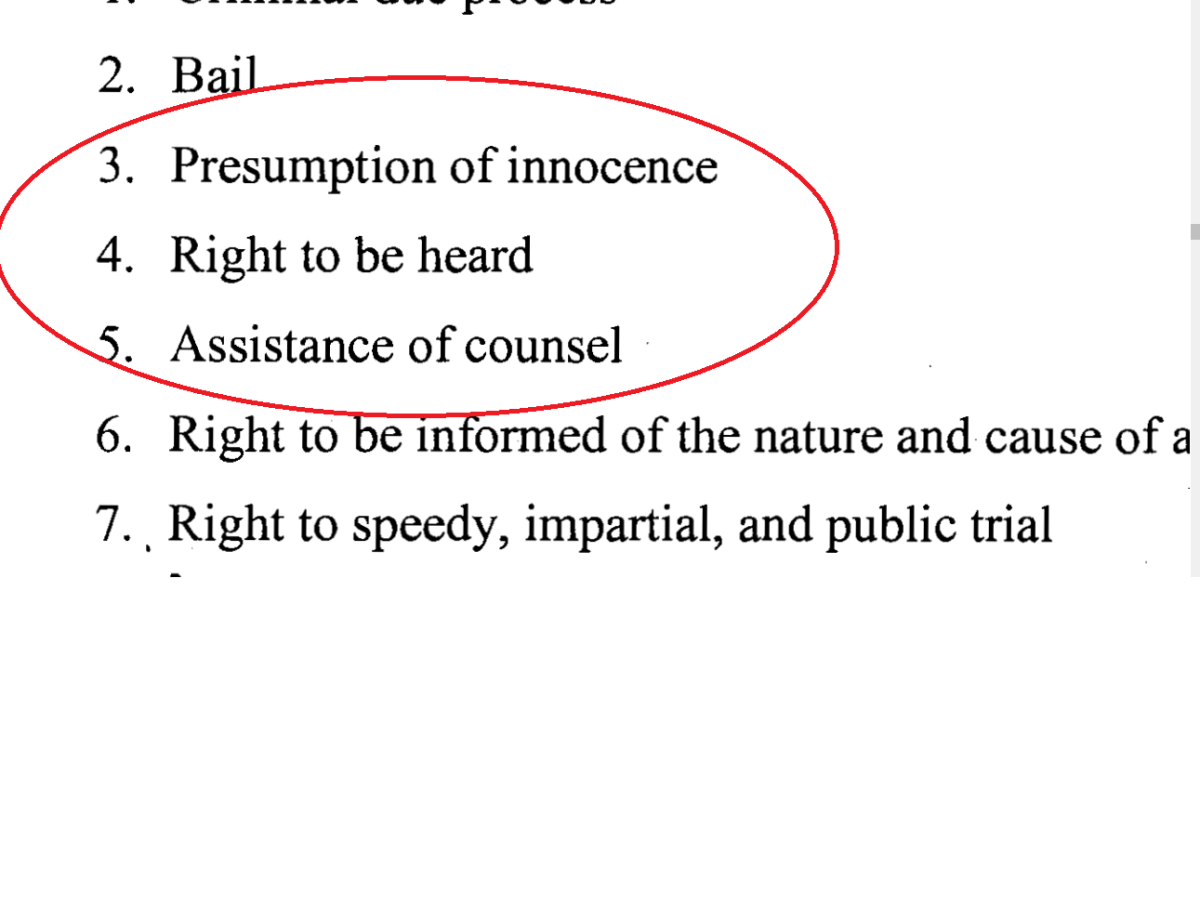
Rights of the Accused: Part II (presumption of innocence, right to be heard, assistance of counsel)
Last time, we talked about criminal due process and bail. Let’s continue our discussion on the rights of the accused with the presumption of innocence. PRESUMPTION OF INNOCENCE This topic seems easy enough to understand, but let’s discuss it anyway. Like almost all of the rights of the accused, the right to be presumed innocent…
Keep reading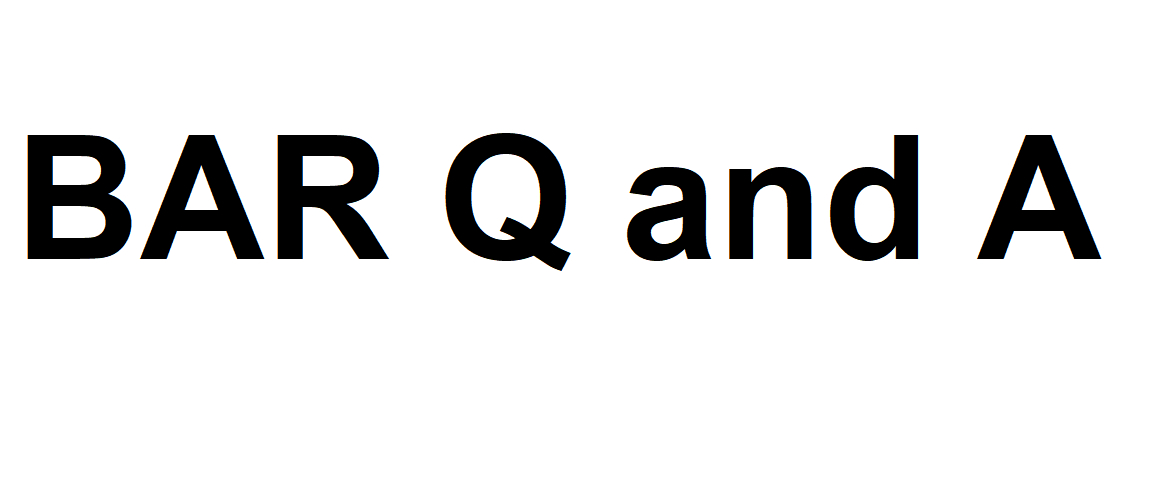
BAR Q and A (ongoing)
I decided to answer Bar Qs during my free time. Please let me know if you think I’m wrong. I’ll start with the freshest topic: the rights of persons under custodial investigation. Rules to follow:1. no unnecessary adjectives2. write in the active voice if possible3. use the echo method4. no double negatives5. brevity6. First paragraph…
Keep reading
Rights of the Accused: Part I (criminal due process, bail)
We’ve recently covered Rights of Persons Under Custodial Investigation. Those rights are available to persons that have been singled out as suspects. Now, let’s go in deeper with the rights of persons already charged with a crime (but some rights here apply even before they are charged). It’s sad that rights of the accused are…
Keep reading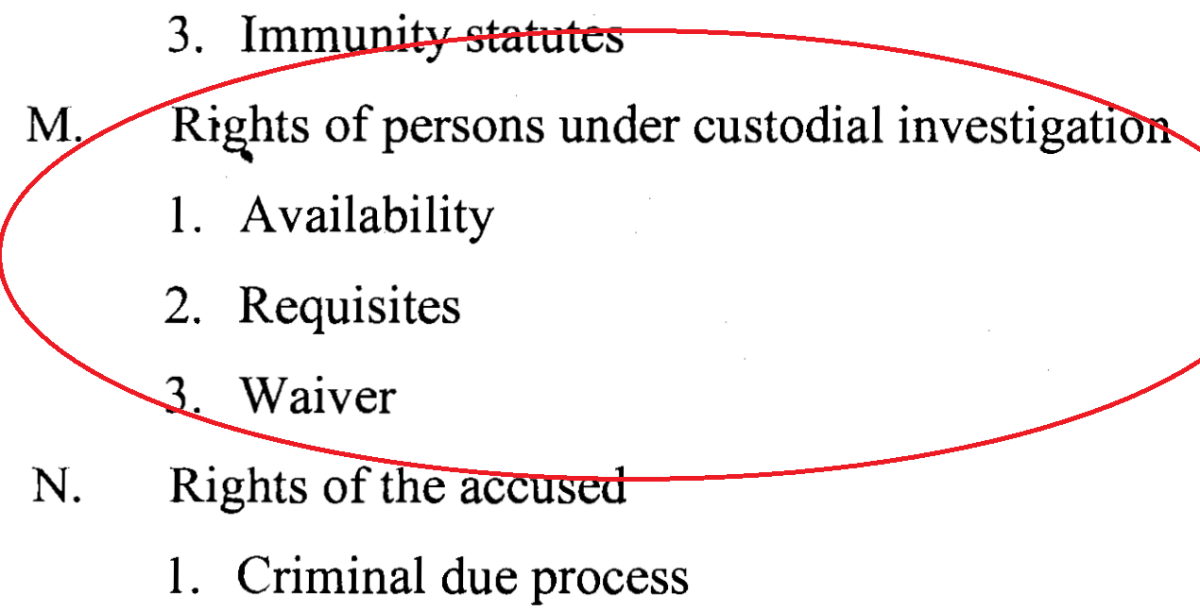
Rights of Persons Under Custodial Investigation
This topic is undoubtedly a bar favorite. So prepare for a long post. Let’s get to it. The rights of persons under custodial investigation seek to provide a balance between the lowly, untrained criminal (though some of them are educated now and may even be public servants) and the cunning, trained law enforcement officers (though…
Keep reading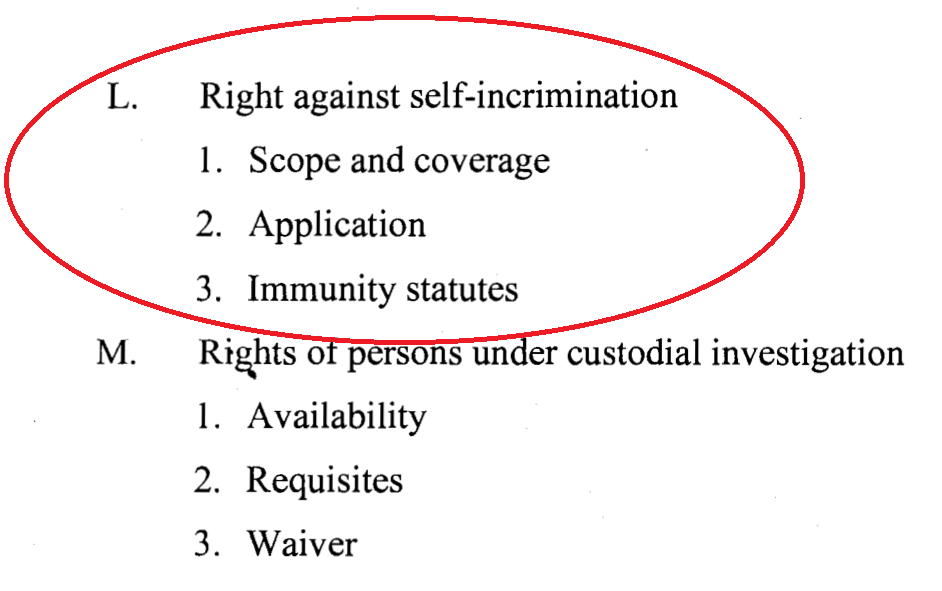
Right Against Self-Incrimination
The right against self-incrimination is embedded in Sec. 17 of the Bill of Rights It prevents the all-powerful State from forcing an accused to testify against himself or to give out testimony that may convict him. It would also be unjust to force people to choose between betraying their inclination to protect themselves (committing perjury…
Keep reading
Adequate Legal Assistance and Free Access to Courts
This topic is a breath of fresh air as we don’t have much to discuss here. It’s funny how our average post has 4.4k words. This will surely bring that number down a bit 🙂 Alright, let’s get to it. Doesn’t the equal protection clause and due process clause already cover this? Yes, but it…
Keep reading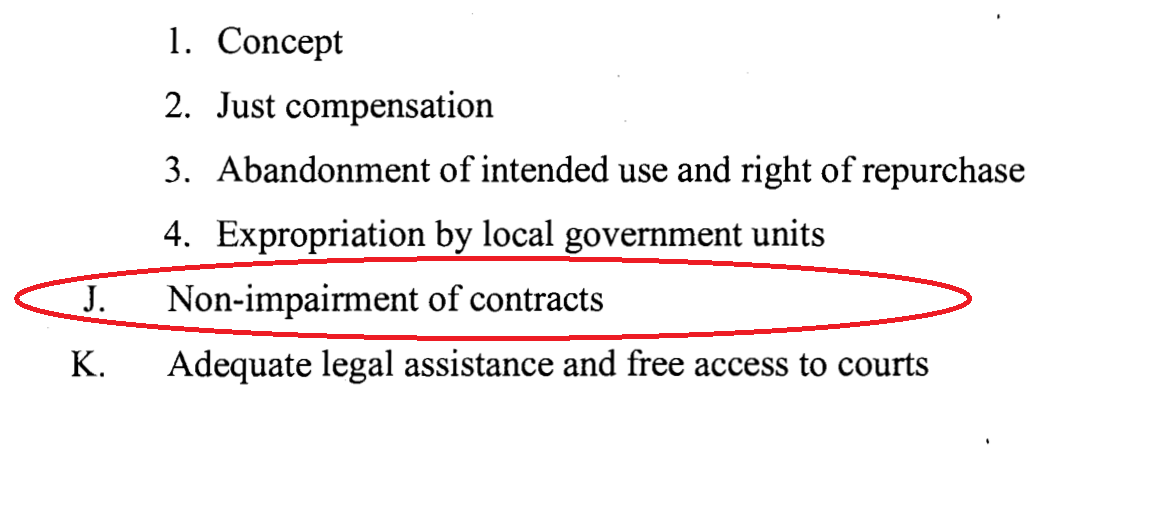
Non-Impairment of Contracts
The impairment clause or the non-impairment clause (either is ok, the same with the establishment clause vis-a-vis non-establishment clause) is to protect the sanctity of contracts against unfair interference from the State. After all, that is what the Bill of Rights is for. This originated in the U.S. when in the revolutionary period, the legislature…
Keep reading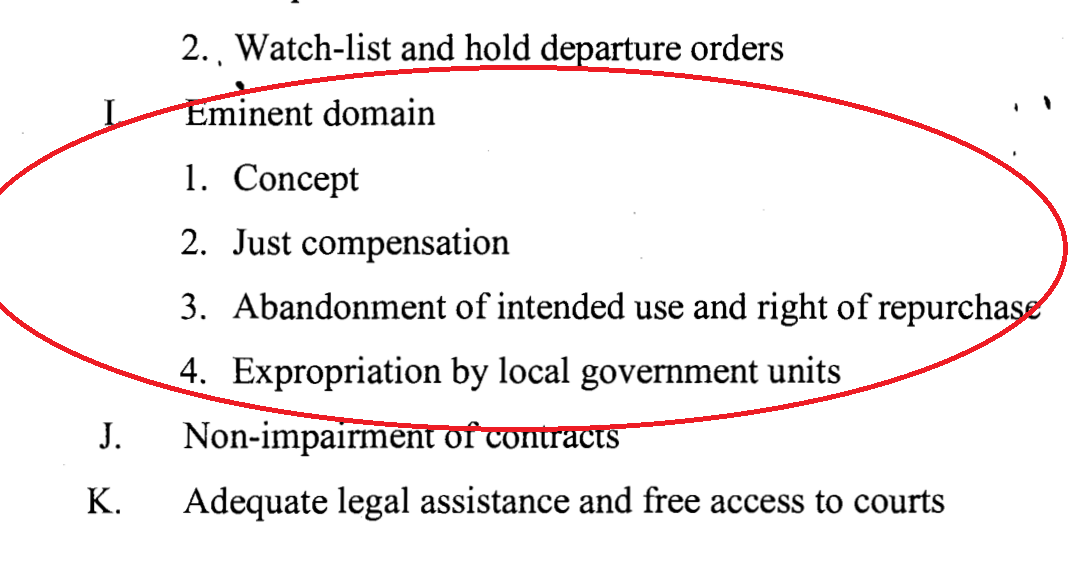
Eminent Domain
Eminent domain (or expropriation) should deserve its own comprehensive discussion as an inherent power of the State where we discuss the concept, just compensation, etc. However, the syllabus dictates that we have that comprehensive discussion right here under Sec. 9 of the Bill of Rights. So, let’s get to it. CONCEPT The SC in a…
Keep reading
Liberty of Abode and Freedom of Movement
I believe congratulations are in order because we’ve hurdled the most difficult provisions of the Bill of Rights. Sections 1-5 have produced so many cases and most of the landmark ones are so divided that all the rulings put together sometimes become confusing. That’s why it feels pretty good to master Due Process, Equal Protection,…
Keep reading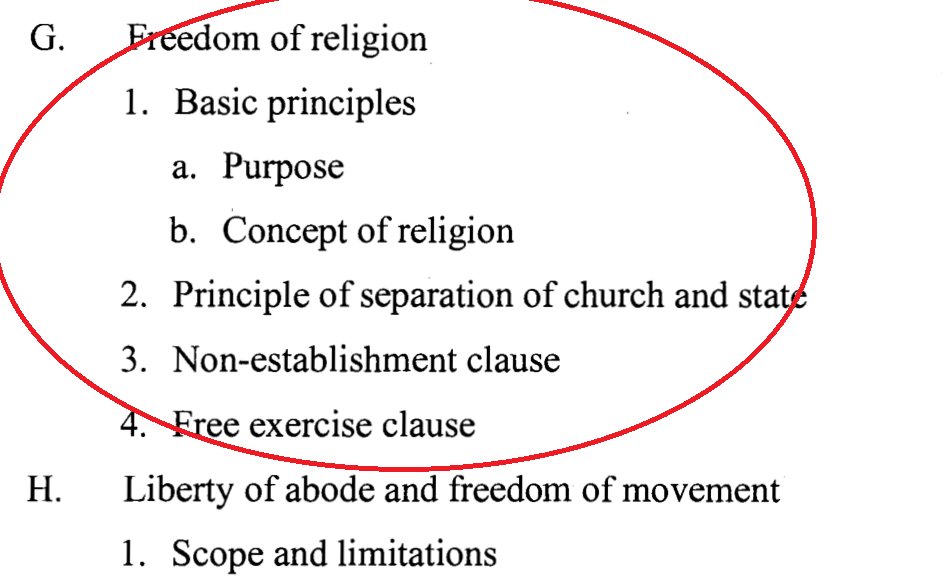
Freedom of Religion
Religion has always been an interesting topic because, if mixed with the law, it becomes a wee bit confusing. It’s very difficult to define religion or religious acts, much more to decide whether to impose any liability or to offer any protection. In other words, rulings in relation to religion are bound to be filled…
Keep reading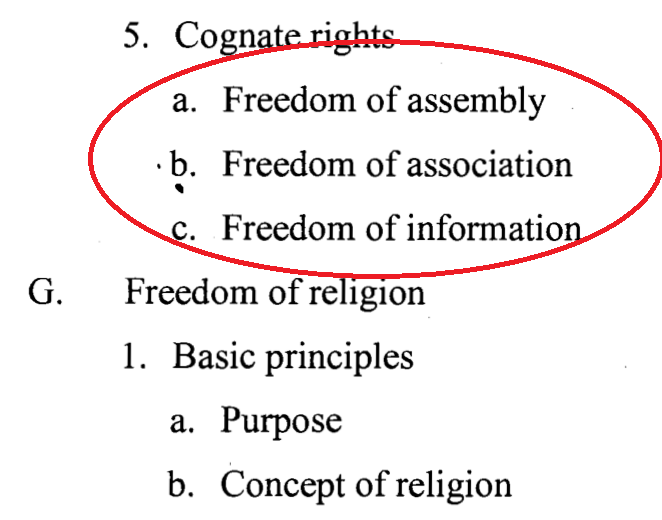
Freedom of Speech and Expression Part IV: Cognate Rights
Finally, we’re at the last part of Section 4. Interestingly, the Supreme Court included Sections 7 and 8 in this part of the syllabus. Anyway, let’s start with the last part of Section 4, the freedom of assembly. Freedom of Assembly “Assembly” means a right on the part of the citizens to meet peaceably for…
Keep reading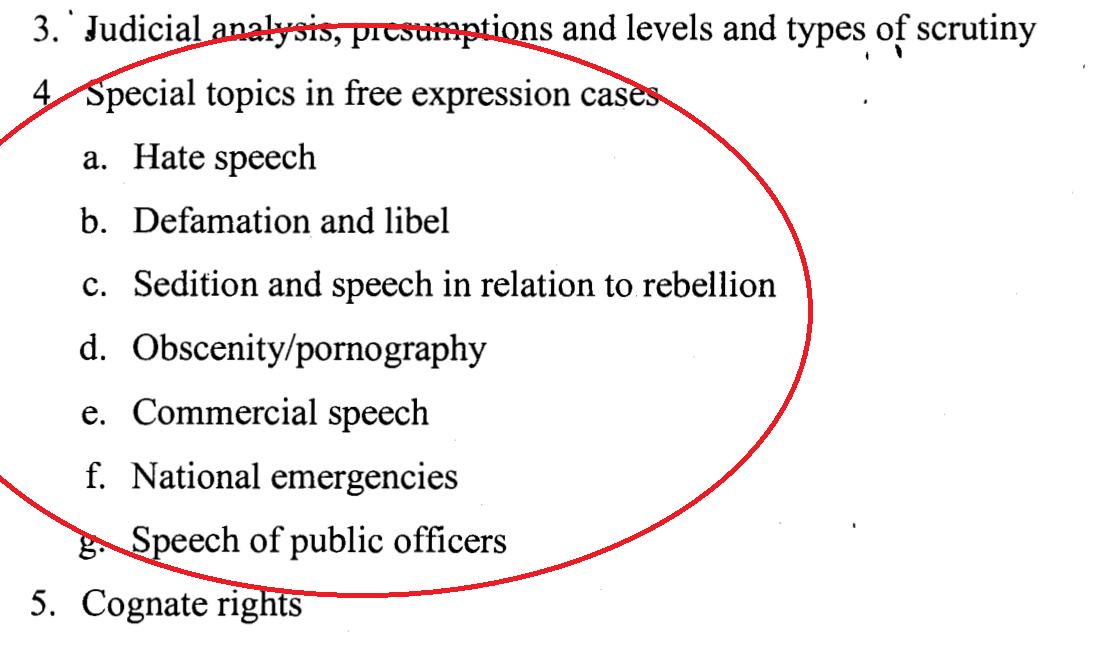
Freedom of Speech and Expression Part III: Special Topics in Free Expression Cases
Most of these were not included in the previous bar syllabus. What does that mean? I don’t know. But, we can only speculate that one of these will come out in the bar. I’m betting on the “sedition and speech in relation to rebellion” and “national emergencies.” Anyway, let’s get to it. a. Hate Speech…
Keep reading
Freedom of Speech and Expression Part II: Types of Regulation & Judicial Analysis
TYPES OF REGULATIONa. Prior restraint and subsequent punishmentb. Content based and content neutralc. Incitement and advocacyd. Specificity of regulation and overbreadth doctrine e. Speech regulation in relation to electionf. Speech regulation in relation to media Our Supreme Court has seen so many eras and has had so many intellectual Justices that we have A LOT…
Keep reading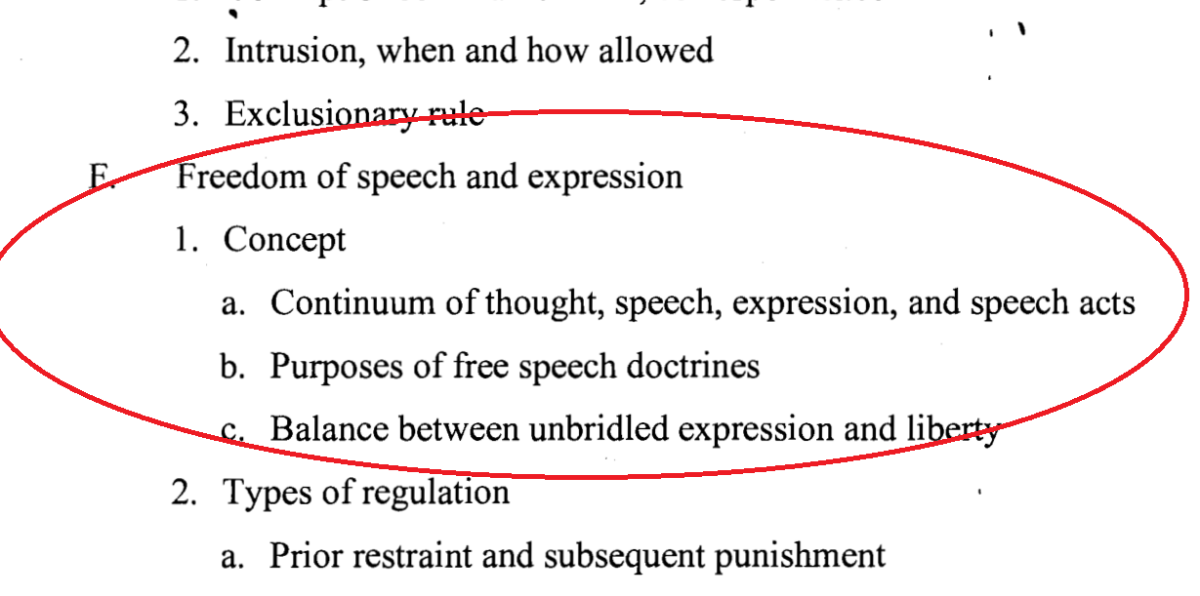
Freedom of Speech and Expression Part I: Concept
Oh boy. Freedom of speech and expression is one of the most complicated topics in Consti law. I think the rulings and doctrines are just all over the place, but we’ll see later on. We have no choice but to face this, so let’s get to it. Continuum of thought, speech, expression, and speech acts…
Keep readingLoading…
Something went wrong. Please refresh the page and/or try again.

